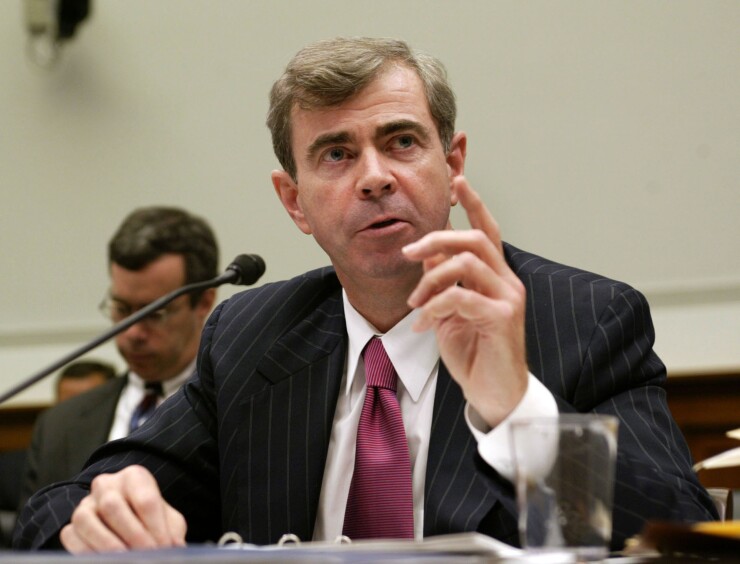Massachusetts fired the latest salvo in the war for a fiduciary standard, drawing return fire from both industry trade organizations and consumer advocates.
Taking on the SEC’s Regulation Best Interest rule, William Galvin, the state’s top financial regulator, filed his own statewide regulations, which he says “will impose a true fiduciary conduct standard in Massachusetts.”
The new regulations, which will go into effect on March 6, will require broker-dealers and broker-dealer agents to provide investment advice and recommendations without regard to the interests of anyone, except the investor.
“Since the SEC has failed to enact a meaningful conduct rule to protect working families from abusive practices in the brokerage industry, it has been left to my office to apply a real fiduciary standard on broker-dealers and agents in Massachusetts,” Galvin said in a statement.
The new Massachusetts fiduciary standard is a direct rejoinder to the SEC’s Reg BI rule, set to go into effect June 30. Galvin’s office proposed its original version of the new regulations in July 2019, followed by a formal comment period and a public hearing on the amended regulations in January.

“Enacting this rule will provide stronger protections for Massachusetts investors, by imposing a heightened duty of care and loyalty on broker-dealers and agents,” Galvin added.
The SEC declined to comment.
Reg BI requires broker-dealers to disclose conflicts of interest and recommend investments in their clients’ best interest. But critics said the rule is a poor substitute for the Department of Labor’s defunct Fiduciary Rule — which protected consumers interest in retirement investment at the federal level until it was
We are very disappointed that Massachusetts has so substantially watered down its original strong proposal.
Galvin’s office contends the Massachusetts rule “goes beyond the SEC’s regulations,” citing as an example a prohibition on all sales contests. Reg BI, according to Galvin’s office, “bans only those contests which are product-specific or limited to particular securities in particular time periods.”
One prominent supporter of the DOL’s fiduciary rule was not impressed.
“We are very disappointed that Massachusetts has so substantially watered down its original strong proposal,” said Barbara Roper, director of investor protection for the Consumer Federation of America. “What’s left is a modest improvement over the federal standard under Reg BI, but it’s not strong enough to address significant shortcomings in that standard and therefore not a model for other states to follow.”
Massachusetts’ amended version of the new fiduciary standard does, however, add definition to the rule by including “a detailed list of requirements” that have been lacking in other proposals, says Bruce Ashton, an attorney for Faegre Drinker Biddle & Reath, writing in the legal blog Lexology.
The requirements are described in Faegre Drinker’s
The rule will likely raise the cost of financial advice for the Commonwealth's investors.
Galvin’s office faced well-organized opposition to its fiduciary proposal, InsuranceNewsNet reported.
A letter-writing campaign from around the country included this line criticizing the rule, the publication said: "I am concerned that if the proposed fiduciary duty is adopted it will have the unintended consequence of severely limiting access to high‐quality, individually‐tailored advice for many of my hard‐working clients in Massachusetts."
Galvin also came under fire for enacting the new rule before the implementation of Reg BI.
The speed with which Galvin enacted the final rule was “deeply concerning,” according to Dale Brown, the CEO of the advocacy group FSI. The organization had urged Massachusetts to wait until after June 30 to enact the rule, Brown said in a statement.
“Massachusetts investors' access to the same selection of financial advice, products and services as the rest of the country is at stake,” Brown said. “Limiting these options puts constraints on their ability to achieve their financial goals. In addition, the rule will likely raise the cost of financial advice for the Commonwealth's investors and lead to confusion for both financial professionals and investors due to differing standards of care.”
We look forward to reviewing the rule.
The Insured Retirement Institute was also critical.
The IRI wanted Galvin to wait until the SEC’s rule went into effect and said in a statement that it is reviewing the new regulation.
“Broadly, we remain concerned that the Massachusetts regulation will limit consumers and investors of their choice of investment professional and of products that are important to retirement planning and financial well-being,” Jason Berkowitz, chief legal and regulatory affairs officer for the IRI, said in the statement.
Another powerful industry trade group had a more muted reaction.
“We look forward to reviewing the rule with particular attention on whether it is consistent with existing federal fiduciary and best interest standards to which our members are subject,” SIFMA CEO Kenneth E. Bentsen Jr. said in a statement, “or whether it may conflict in ways — whether intended or unintended — that would impede our members from best serving their retail clients.”





